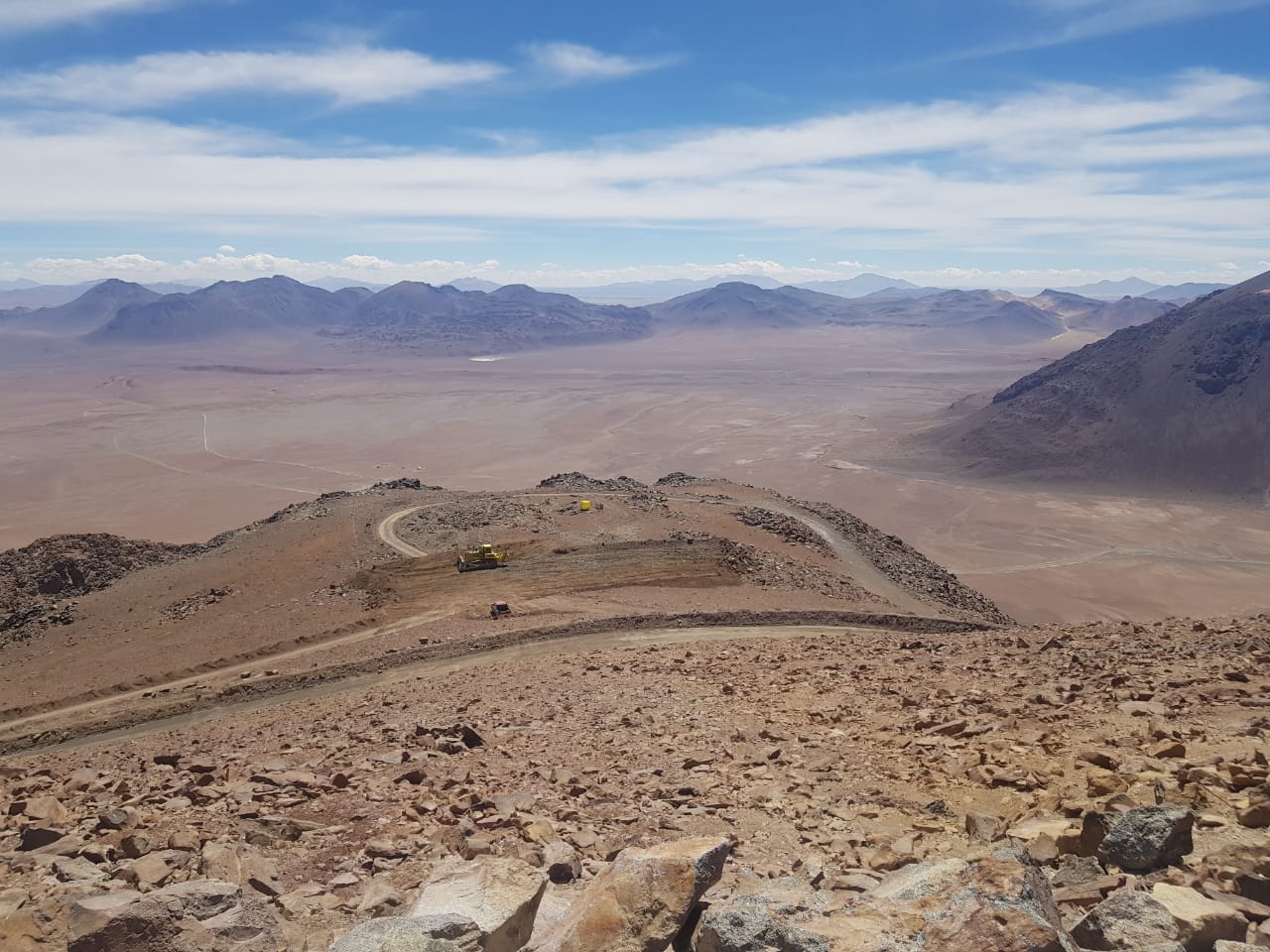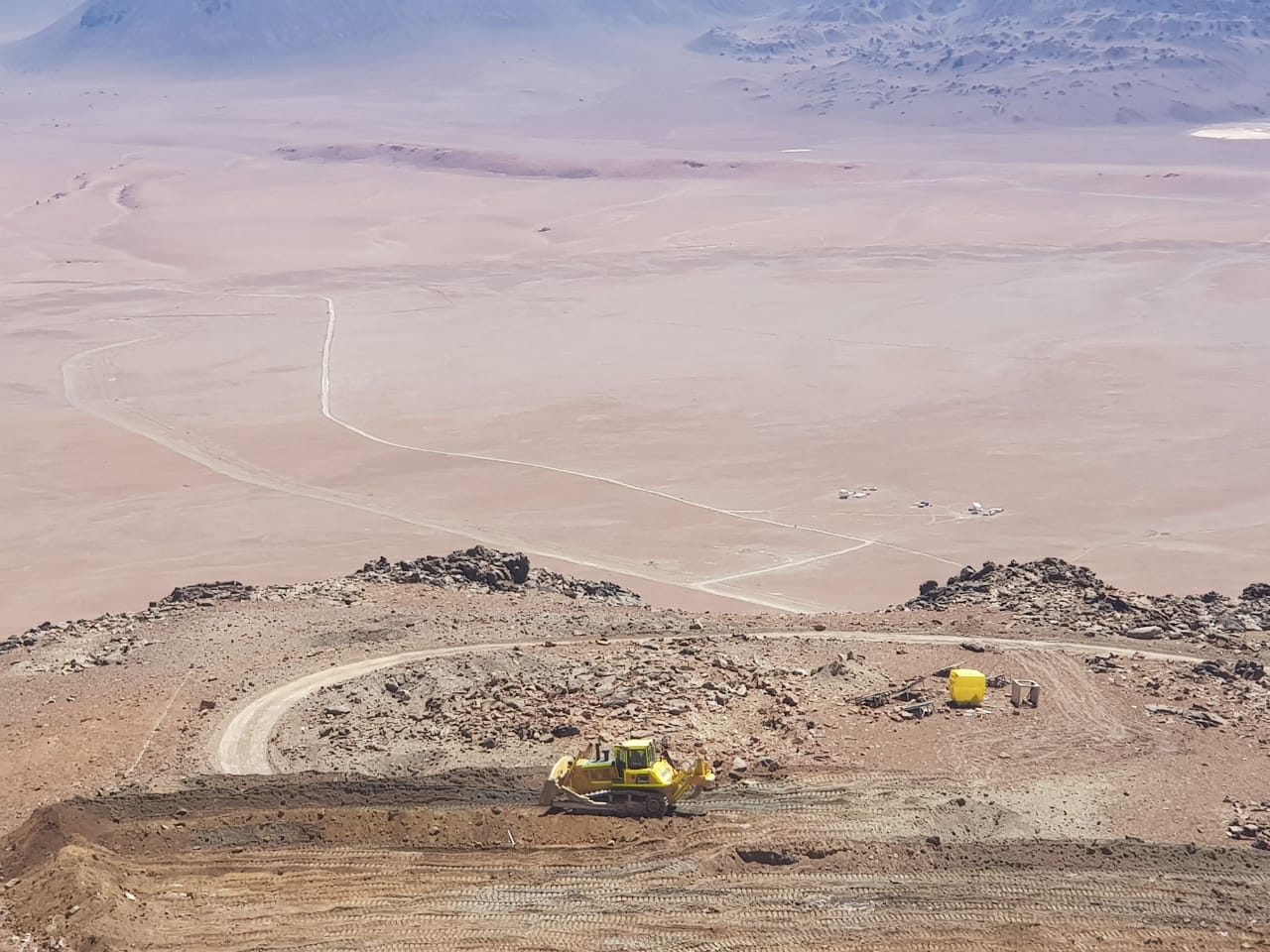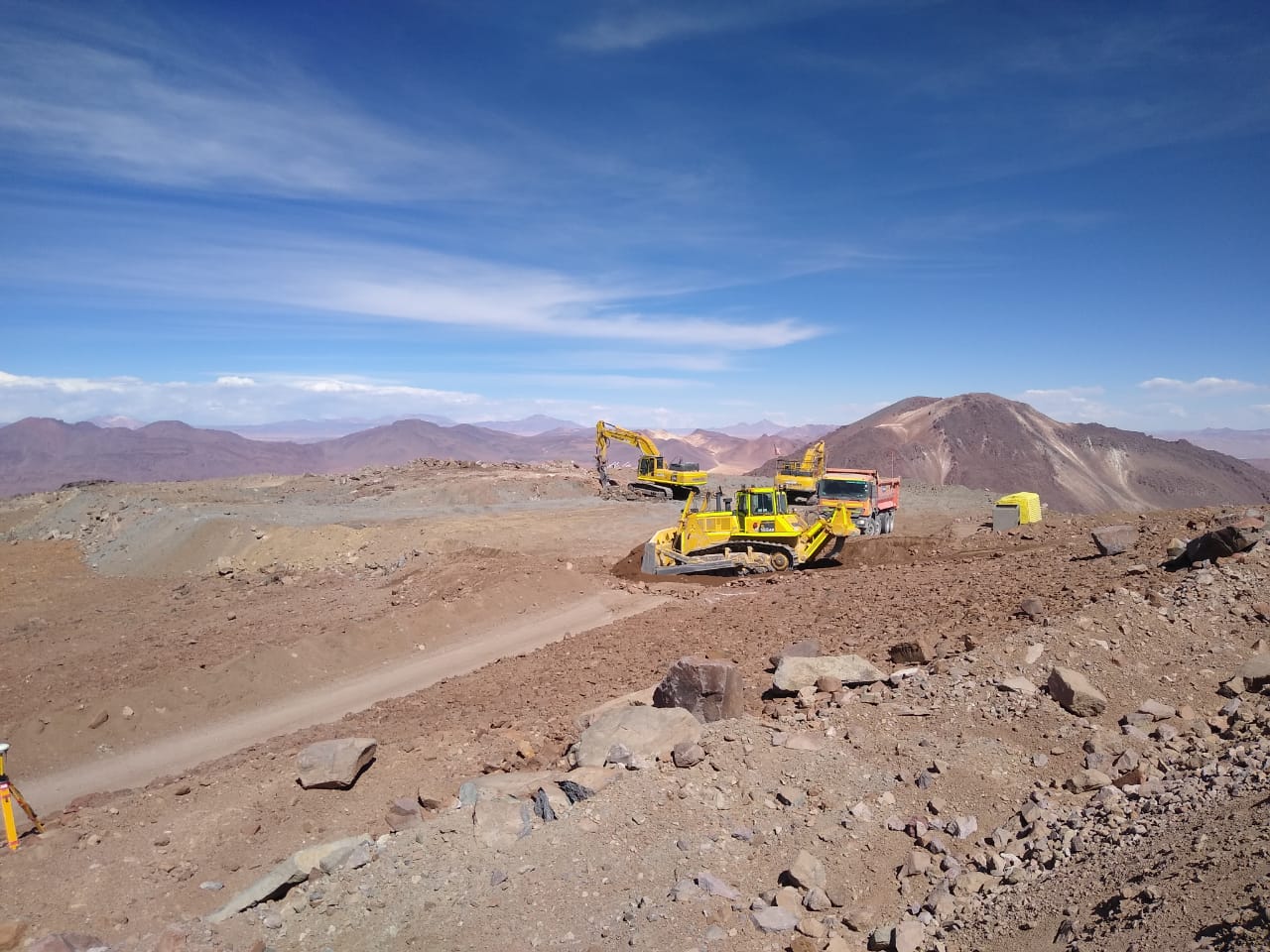News & Events
|
Wednesday, April 10, 2024
The newly assembled Fred Young Submillimeter Telescope (FYST), nearly the size of a five-story building, was unveiled April 4 at an event in Xanten, Germany, attended by numerous German municipal officials – as well as Fred Young, himself.
|
| See https://news.cornell.edu/stories/2024/04/major-new-telescope-structure-completed-germany for more information. |
|
Tuesday, April 09, 2024 Wie ist das Universum entstanden? Dabei soll in Zukunft ein Teleskop helfen, das Galaxien in Millionen Lichtjahren Entfernung aufnehmen kann. Am Donnerstag wurde es in Xanten vorgestellt.
How did the universe come into being? In the future, a telescope that can record galaxies millions of light years away will help. It was presented in Xanten on Thursday.
WDR, 04.04.2024 WDR Lokalzeit, 04.04.2024 |
| Read more... |
|
Tuesday, July 25, 2023 More than 80 scientists and engineers (20 online) participated in the fourth annual meeting of the CCAT Consortium on June 20-22 on Cornell’s campus. CCAT Observatory Inc. is a Cornell-led international consortium that is building the Fred Young Submillimeter Telescope (FYST) that is currently being assembled in Germany. Read the full Cornell A&S Communications article at the link below. |
| See https://as.cornell.edu/news/science-plans-telescopes-first-light-focus-ccat-consortium-meeting for more information. |
|
Monday, July 10, 2023 For the past six years, CCAT Observatory Inc., a nonprofit research organization formed by more than a dozen academic institutions led by Cornell University, has been developing a new telescope, the Fred Young Submillimeter Telescope (FYST, pronounced “feast”) and its supporting infrastructure to observe at sub-millimeter wavelengths. Read the full article by Stephen Parshley (CCAT Project Engineer) in Cold Facts International, the Magazine of the Cryogenic Society of America, Inc. … |
| Read more... |
|
Friday, May 19, 2023
Expanding the scope of exploration is the focus of “ … |
| Read more... |
|
Tuesday, May 16, 2023
|
| Read more... |
|
Friday, May 12, 2023
On May 11, 2023, Thomas Nikola received a Cornell Center for Astrophysics and Planetary Sciences (CCAPS) Research Incentive Award for his critical contributions to CCAT/FYST/EoRSpec and the deployment of ZEUS-2 on APEX, and his terrific mentorship of graduate and undergraduate students. Congratulations Thomas!
|
|
Thursday, May 04, 2023 In the latest issue of Cold Facts, the magazine of the Cryogenic Society of America, our very own Eve Vavagiakis and Hanna Krüger are among the 15 distinguished women in cryogenics and superconductivity recognized for 2023. Congratulations, Hanna and Eve!! |
|
Tuesday, January 31, 2023 The construction of the Fred Young Submillimeter Telescope (FYST, pronounced “feast”) being developed by CCAT Observatory Inc., an international consortium of universities led by Cornell, is drawing closer to an end. |
| See https://as.cornell.edu/news/cornell-led-telescope-project-completion-sight for more information. |
|
Wednesday, January 11, 2023
Prof. Norm Murray will be the Keynote Speaker at the AAS Meeting. He is the recipient of the 2022 Dannie Heineman Prize for Astrophysics.
|
| See https://astrobites.org/2023/01/10/meet-the-aas-keynote-speakers-dr-norman-murray/ for more information. |
|
Wednesday, December 21, 2022
“Riccardo will be missed by all of us who treasured his gracious collegiality and kindness in working with colleagues and students and his passion for the science of astronomy,” said Jonathan Lunine, the David C. Duncan Professor in the Physical Science and chair of astronomy (A&S).
|
| See https://news.cornell.edu/stories/2022/12/eminent-astronomer-riccardo-giovanelli-dies-76 for more information. |
|
Tuesday, December 20, 2022 CCAT-Collaboration: Science Goals and Forecasts with the Prime-Cam on the Fred Young Submillimeter Telescope. The CCAT-Collaboration presents a detailed overview of the science goals and predictions for the Prime-Cam direct-detection camera–spectrometer being constructed by the CCAT-prime collaboration for dedicated use on the Fred Young Submillimeter Telescope (FYST). Astrophysical Journal Supplement Series, Dec 16, 2022 |
| See https://iopscience.iop.org/article/10.3847/1538-4365/ac9838 for more information. |
|
Thursday, June 30, 2022
Martha Haynes' chapter, “Hands on Adventures with Telescopes: From the Backyard to Cerro Chajnantor,” appears in “The Sky Is for Everyone: Women Astronomers in Their Own Words,” edited by Virginia Trimble and David A. Weintraub.
|
| See https://as.cornell.edu/news/follow-your-dreams-writes-astronomer-martha-haynes for more information. |
|
Monday, May 09, 2022 An enormous hole 22 meters in diameter has been dug near the summit of Cerro Chajnantor in Chile’s Atacama Desert, at an elevation of 18,400 feet. The hole stands ready for the cement foundation on which the Fred Young Submillimeter Telescope (FYST, pronounced “feest”) will one day rest. The foundation, which was designed in Chile, began construction in the fall of 2021 and is scheduled to be installed at the summit from May to June.
|
| Read more... |
|
Wednesday, April 20, 2022 Researchers have developed a new approach that could make it easier to watch the birth of the Universe's first stars.
Read the full Physics release. Related publication: Mapping the Universe in hydrogen deuteride, Breysse, P.C., … |
| Read more... |
|
Thursday, March 17, 2022 The third annual CCAT Collaboration Meeting (CCM3) will be held from April 4 – 6, 2022. The CCAT-prime observatory (www.ccatobservatory.org) will feature the Fred Young Submillimeter Telescope (FYST) which is currently under construction. FYST will be a 6-meter diameter, 10-micron surface precision telescope working at submillimeter to millimeter wavelengths. It will operate in survey mode only and first light is expected in 2024. This meeting will provide an update on … |
| Read more... |
|
Monday, February 14, 2022
The Heineman Foundation, American Institute of Physics, and American Astronomical Society announce Norman Murray, professor at the Canadian Institute for Theoretical Astrophysics, University of Toronto, as the winner of the 2022 Dannie Heineman Prize for Astrophysics.
|
| See https://www.aip.org/news/2022/norman-murray-awarded-2022-dannie-heineman-prize-his-astrophysical-insights for more information. |
|
Wednesday, November 10, 2021
The CCAT-prime telescope project has been awarded $1.3 million by the National Science Foundation (NSF) to develop instrumentation that will measure galactic dust polarization and the oldest light in the universe.
|
| See https://news.cornell.edu/stories/2021/11/nsf-awards-13m-ccat-prime-telescope-project for more information. |
|
Tuesday, May 11, 2021 More than a hundred people gathered virtually at the end of April for the 2021 annual conference on the CCAT-prime project, which is building the Fred Young Submillimeter Telescope (FYST) in Chile.
|
| See https://news.cornell.edu/stories/2021/05/annual-conference-new-telescope-moves-science-ahead for more information. |
|
Tuesday, March 16, 2021 The second annual CCAT-prime/FYST Collaboration Meeting (CCM2) will be held from April 20 – 24, 2021. The CCAT-prime observatory (www.ccatobservatory.org) will feature the Fred Young Submillimeter Telescope (FYST) which is currently under construction. FYST will be a 6-meter diameter, 10-micron surface precision telescope working at submillimeter to millimeter wavelengths. It will operate in survey mode only and first light is expected in 2023. This Collaboration Meeting aims … |
| Read more... |
|
Monday, March 08, 2021 A team of Canadian researchers led by University of Waterloo professor Michel Fich have been awarded $4.9 million in funding from the Canada Foundation for Innovation to help build a next generation telescope, the Fred Young Submillimeter Telescope (FYST).
|
| See https://as.cornell.edu/news/fys-telescope-partners-canada-receive-new-49-million-grant for more information. |
|
Wednesday, December 02, 2020 CCAT officially broke ground near the summit of Cerro Chajnantor on November 27th. These photos show the beginning of the follow-on summit leveling process that began in earnest on December 1st. View this Cornell A&S Communications article for more details, and the University of Cologne's press release here.
|
| Read more... |
|
Wednesday, September 16, 2020
The powerful new telescope being built for an exceptional high-elevation site in Chile by a consortium of U.S., German and Canadian academic institutions, led by Cornell, has a new name: the Fred Young Submillimeter Telescope (FYST).
|
| See https://news.cornell.edu/stories/2020/09/breakthrough-telescope-chile-renamed-benefactor-alum for more information. |
|
Tuesday, July 07, 2020 Martha Haynes, Goldwin Smith Professor of Astronomy, has been awarded the 2020 Karl G. Jansky Lectureship by Associated Universities, Inc. and the National Radio Astronomy Observatory (NRAO). The Jansky Lectureship recognizes outstanding contributions to the advancement of radio astronomy and is being awarded to Haynes “for her influential impact to our understanding of galaxies.” Read the complete Cornell A&S Communications story at the link below. |
| Read more... |
|
Thursday, June 18, 2020 For 37 years, Martha Haynes has studied the evolution of galaxies. Now she leaves behind a groundbreaking new telescope for the next generation. Read the story on the Cornell Research website listed below. |
| See https://research.cornell.edu/news-features/exploring-extragalactic-neighborhoods for more information. |
|
Thursday, June 18, 2020 A new animation about two innovative telescopes being developed at Cornell has just been released by the research group led by Michael Niemack, associate professor of physics and astronomy in the College of Arts and Sciences. Read the story on the Cornell Chronicle website listed below. |
| See https://news.cornell.edu/stories/2020/06/new-video-engages-public-cosmic-exploration for more information. |
|
Thursday, April 30, 2020 Two weeks before the first annual CCAT-prime collaboration meeting was scheduled to be held April 7 at the University of Waterloo, the COVID-19 pandemic forced a switch to an online format. “It was gratifying to note the widespread interest in CCAT-prime based on the number of attendees of the recent Zoom meeting,” said Fred Young, ’64, M.Eng. ’66, MBA ’66, an active participant in the meeting and major supporter of the project. |
| See https://as.cornell.edu/news/science-new-telescope-advances-virtual-conference for more information. |
|
Tuesday, August 06, 2019 Martha P. Haynes, the Goldwin Smith Professor of Astronomy, has been awarded the 2019 Catherine Wolfe Bruce Gold Medal from the Astronomical Society of the Pacific. The medal is presented annually to a professional astronomer in recognition of a lifetime of outstanding achievement and contributions to astrophysics research. |
| See https://astro.cornell.edu/news/astronomy-professor-receives-bruce-medal-careers-work for more information. |
|
Thursday, May 09, 2019 As humans, we have an insatiable desire to understand the cosmos and our place in it. How did the universe begin and how did it evolve? What is the nature of dark matter and dark energy? How will it all end? “These are the most fundamental questions one can ask,” says Steve Kang Hoon Choi, Cornell Presidential Postdoctoral Fellow. “If we believe greater knowledge betters our lives, then this is what drives us to study the cosmos.” |
| See https://astro.cornell.edu/news/telescopes-help-decode-cosmos for more information. |
|
Thursday, November 29, 2018
Fabrication of the Cerro Chajnantor Atacama Telescope-prime (CCAT-p), a powerful telescope capable of mapping the sky at submillimeter and millimeter wavelengths, has now begun, marking a major milestone in the project.
|
| See http://news.cornell.edu/stories/2018/11/fabrication-powerful-telescope-begins for more information. |
|
Wednesday, August 01, 2018 Martha Haynes, the Goldwin Smith Professor of Astronomy, led an audience of students and faculty on a “journey across space and time” April 25 in Philip Lewis Hall. |
| See http://news.cornell.edu/stories/2018/04/martha-haynes-tours-heavens-phi-beta-kappa-lecture for more information. |
|
Thursday, March 29, 2018 Teams of scientists, including researchers from the Cornell physics and astronomy departments, are collaborating on two of the largest telescopes ever built to take readings on the universe’s oldest light measurable, known as the Cosmic Microwave Background, or CMB. Read the full Cornell Chronicle story here. |
| See http://news.cornell.edu/stories/2018/03/cornell-researchers-build-telescopes-measure-universes-earliest-light for more information. |
|
Monday, October 16, 2017 Posted on Scitech Now, October 2, 2017 -- In 2021 astronomers will dive deeper into outer space with the use of a 23 million dollar telescope in one of the world’s highest deserts located in Chile. Martha Haynes, Cornell University Professor of Astronomy, joins Hari Sreenivasan via Google Hangout to discuss the project. |
|
Tuesday, April 18, 2017
A new telescope being built in the high desert of Chile will peer further into our universe's origins than any other.
|
| See http://www.cbc.ca/news/technology/ccat-p-dalhousie-cerro-chajnantor-atacama-telescope-scott-chapman-1.4071239 for more information. |
|
Wednesday, April 05, 2017
Scientists announced this week that a consortium of U.S., German and Canadian academic institutions led by Cornell University will begin construction of Cerro Chajnantor Atacama Telescope-prime (CCAT-p), a unique and powerful telescope capable of mapping the sky at submillimeter and millimeter wavelengths.
|
| See http://as.cornell.edu/news/breakthrough-telescope-be-built-chile for more information. |
|
Tuesday, April 04, 2017 Read about the CCAT-prime Telescope here |
|
Friday, January 17, 2014
Cornell Chronicle, 1/16/14
|





